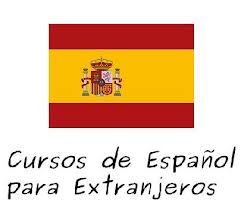Soy extranjera. I am a stranger.
Soy extranjera en una tierra nueva. I am a stranger in a new land.
I am in Spain. I am not of Spain. I tread lightly, fearing to make a mark. I tread heavily, fearing to be disengaged.
The newspapers inform but they do not explain. They do not explain the private impact on my neighbours' lives. To me, the early almond blossom suggests a walk and a photograph, good or bad. To my neighbour it dictates the summer harvest and the winter's income, good or bad.
I hear and understand conversations in which I am involved. I hear but do not understand the rapid buzz all around me in which information is being exchanged, feelings shared, emotions glimpsed. Soy extranjera.
I read, ingest and consider all I can. My mind knows and understands the turmoil of 20th-century history in my adopted homeland. My heart feels for the people, but my heart cannot feel what they feel. I understand why that family does not use that shop. I understand why that man does not visit that bar. I understand, I try to feel it, but I do not share that pain. I was not born with the experience of war, of tyranny, of neighbour turning on neighbour. Their experience is not my experience. Their history is not my history.

Their children grow up with the poetry of Lorca, and the writings of Cervantes, Márquez, Mendoza, and Carlos Ruiz Zafón. Not Shakespeare, Dickens, Enid Blyton or Winnie the Pooh. The universal experience of childhood is divided by twelve hundred miles and a different frame of reference. My heart enjoys but does not stir to the music that stirs their hearts.
Soy extranjera.
I can adopt patterns of behaviour, later mealtimes, summer siestas. I can take part, be engaged, walk alongside my neighbours, cheer their sporting triumphs. I cannot walk in their shoes, I cannot live their lives, I cannot leave behind my own history, my own experience.
Expats, foreigners, immigrants. Just words for strangers. Just words for people who previously had been somewhere else. From somewhere else to here. And here we are, strangers in a foreign land, surrounded by people whose shared experience we do not share. Soy extranjera en una tierra nueva.

Over time conversation becomes easier. Groups and higher volume continue to exclude. The larger the crowd, the louder the conversation, the more the words run together and become no more than sounds, noise. A bubble forms around me and the noise creates a cocoon of silence in the middle of the swirl of language. In a foreign land it is easy to be alone in a crowd and allow the stream of words to wash past, unaware of nuances. I discover that this creates more time, more thinking time.
In the past, when I have had foreigners as neighbours, have I been as patient as my neighbours are here? Did I check they had candles in their first power-cut in a new country? Did I call round to explain the notice in the letter-box? As winter approached, did I ask if they knew where to get fuel? Did I offer food and drink in the chaos of their unpacking? Where I may have failed others in the past, my Spanish neighbours did not fail me. Soy extranjera, yet I have not been treated so. My questions have been answered kindly, they have educated the ignorant stranger. They do not understand what it is I do not understand - my lack of knowledge at times amuses them, and at times must appal them. But despite the yawning gaps, we rub along. We exchanged gifts on Kings' Day, the women and I share occasional morning coffee on the pavement in our dressing gowns, and now in a power-cut I too can offer candles and matches. Soy extranjera. I will always be the extranjera in our street. And there's nothing wrong with that.

Because this is home now. This country, this region, this village means the world to me.
I never believed it would be easy. I just knew it would be worth it.
© Tamara Essex 2013